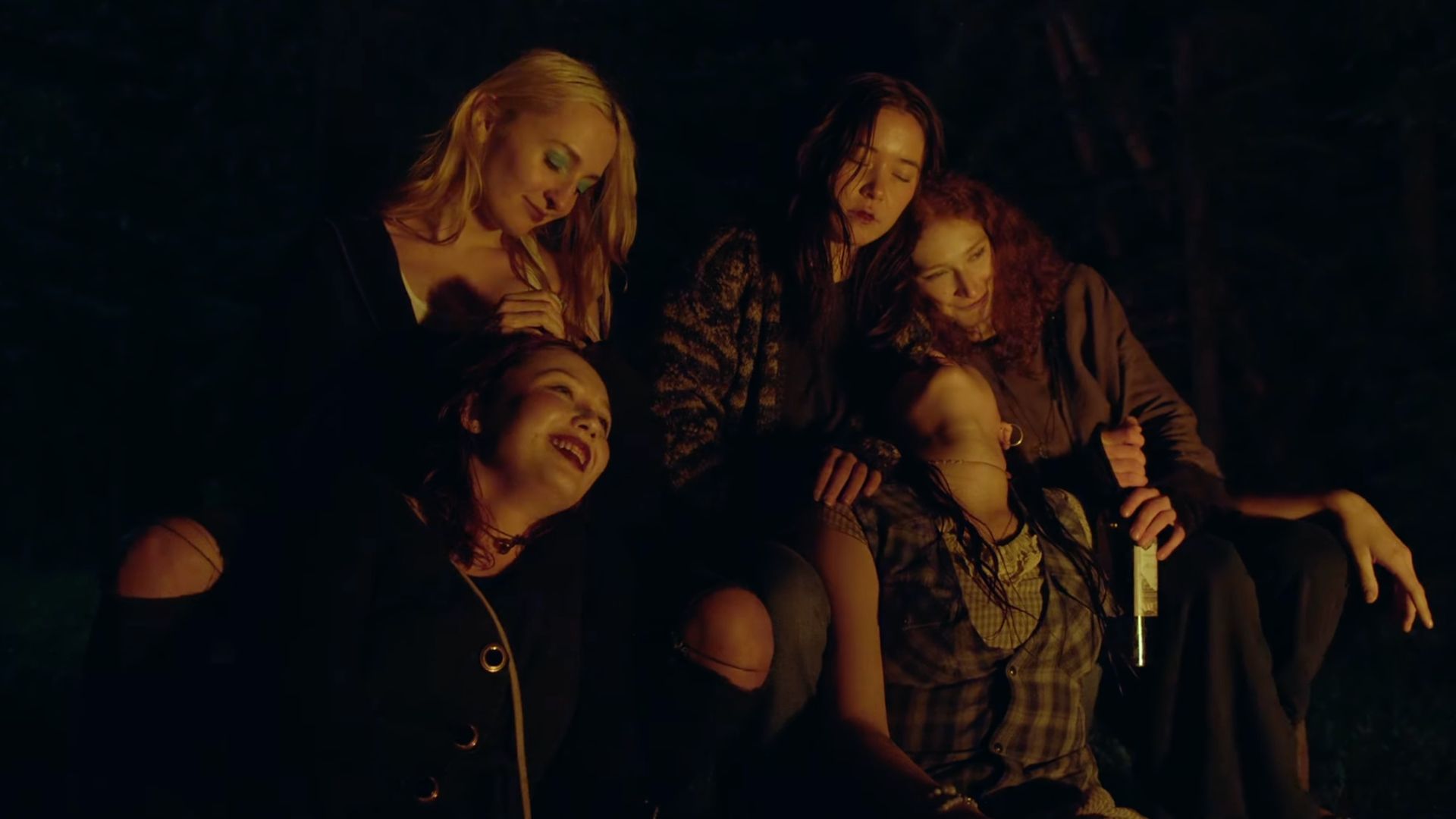The weight of trauma can eat a person alive from the inside, gnawing at their psyche and claiming every moment as its own. But, to be free from trauma’s all-consuming influence, we must be open to the unpredictable, windy road to healing. In writer-director Avalon Fast’s sophomore feature CAMP, letting go, self-forgiveness and rebirth come with the help of community, magic and sacrifice.
The coming-of-age film follows a young woman (perhaps in her late teens, or perhaps her early twenties) named Emily (a wonderfully emotive Zola Grimmer), whose run-ins with death and disaster have colored her relationship with guilt and personal responsibility. The audience is almost immediately informed that Emily accidentally killed a 4-year-old girl with her car after said little one ran into oncoming traffic — a tragic tale told via a painfully uncomfortable and satirical game of Truth or Dare. (Admittedly, “I killed a kid once,” can really alter the vibe of a room.)
Soon after this revelation, Emily’s good friend fatally overdoses on a bad batch of drugs; horrific fatalities seem to follow our ill-starred protagonist, calamitous situations that are written with such precision that conversations concerning “fault” and “blame” are unproductive. Of course, Emily blames herself, and her youth is swallowed by guilt, depression and a looming sense of dread. When she leaves home to start anew with her father, his suggestion that she attend a nameless summer camp “for damaged kids” as a counselor is met with hesitation. As desperation for new feelings, a new environment and a new purpose sink in, Emily chooses to become a camp counselor. With a quick Google search, Emily is stunned by images of crosses, unaware that she was about to become a leader at a “God camp.” For someone who proudly lives a godless life, the time to have faith is now.
COnsidering that it takes place at a Christian summer camp, Fast’s film is surprisingly not very religious, and only provides minimal exploration of “Catholic guilt” themes. However, CAMP is certainly a spiritual trip. It’s a fairycore, cottagecore descent into another realm, a realm that allows Emily to come as she is. Encouraged to reveal her wounds to the camp’s tight-knit group of witchy women counselors, Emily finds herself torn between the comforts of home and a frightening new reality that honors and forgives the ugliness that haunts her.
Wish Rituals, the Divine Feminine and Redemption
We soon realize not everyone at camp is a stereotypically mild-mannered Jesus freak — in fact, every one of them has a heightened personality. Her bunkmate, Rosie (Cherry Moore), is eerily outgoing and welcoming; she has face piercings and a cherry tattoo, gloats about the counselors getting sloppy drunk every year and offers Emily a hit of marijuana. Rosie’s clichéd wild-child nature is given slightly more depth when she mentions having once been a mother. Although not much information is given about Rosie’s past, Emily is clearly not the only counselor there who’s dealing with trauma.
When Emily is assigned a camper, a disturbed little girl named Eden (Izza Jarvis), her time at camp becomes more sinister. The symbolism behind Eden’s identity is left to audience interpretation: Her aversion to Emily feels personal, and she may be a figurative version of the 4-year-old girl Emily fatally hit with her car. Her scenes tie in some of the film’s recurring motifs, including blood dripping down women’s legs — first exhibited when Eden gets her first period — and the concepts of luck and misfortune. Eden and Emily’s hunt for four-leaf clovers speaks volumes.
Emily’s bond with the counselors grows, especially with Clara (Izza Jarvis), who acts as a soulmate of sorts. The girls get wine drunk and perform “wishing” rituals in one of the cabins’ attics, foreshadowing a more intense full moon ritual that’s the cherry on top of a blissfully hallucinatory cake. The girls’ supernatural powers are connected to some sort of sacrifice, which provides the film with its most controversial and puzzling moral: CAMP implies that healing is achieved through community, love, personal growth, vulnerability and self-forgiveness. With this in mind, the intentions of its sacrifice aspect — not self-sacrifice, but sacrifice of another — are questionable. The whole film’s relationship with faith is a doozy, for better or worse, and one particular line stands out: “God brought me to the devil and to my closest friends.”
With obvious similarities to The Craft‘s occult girlhood vibes, a potent feminist message, a religious camp that’s akin to the lesser-known Into the Dark: Pure and the ethereal daylight horror of Midsommar, CAMP has a lot to offer. Its narrative exploration of guilt and grief through witchcraft, drugs and female bonding can feel a bit too loose, even sluggish, at times. But CAMP‘s mixed-media risk-taking, which involves everything from grainy film to naturalistic aesthetics inspired by Renaissance art to a picturesque forest setting, are resplendent.
Fast’s unique filmmaking vision cuts through the noise of anything remotely ordinary, and cinematographer Eily Sprungman has the ability to make every camera pan and angle intimately affecting. CAMP’s visuals surpass its linear storytelling abilities: It’s hard to forget the sight of angel-like figures doused in light tiptoeing through the woods or floating in a glimmering lake. And it’s nearly impossible to look away from Emily’s trek through the sun-drenched grass or her paranoid walk through Cabin 18, a high-contrast scene consumed by anxiety-inducing red lighting. For those able to accept a slightly undercooked, ambiguous narrative while enjoying a visual feast, CAMP is a beautiful work.
After its world premiere at Fantastic Fest, CAMP brought its ethereal brand of female angst and kinship to the Brooklyn Horror Film Festival.

